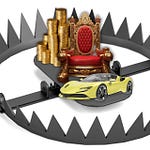Power tends to corrupt, and absolute power corrupts absolutely. Great men are almost always bad men, even when they exercise influence and not authority: still more when you superadd the tendency or the certainty of corruption by authority.
Lord Acton
Why are bosses so overpowered by the power of having power?
An Atlantic article by Jerry Useem, provocatively entitled “Power Causes Brain Damage,” looks at studies showing how leaders, in their ascent to power, may lose essential mental capacities, particularly the ability to identify with and understand others.
The thing is, the piece’s headline is not metaphorical. The brain damage may be real. Useem describes the conclusions of a UC Berkeley researcher who found that study subjects who were in power positions, “acted as if they had suffered a traumatic brain injury—becoming more impulsive, less risk-aware, and, crucially, less adept at seeing things from other people’s point of view.” (This researcher’s other findings also confirm what I always suspected: that drivers of expensive vehicles are much more likely to drive like jerks.)
Another study Useem cites used brain scanners to show that a neural process associated with empathy—an essential quality for effective leadership—is seemingly “anesthetized” in those with power. Power, in this instance, is less like brain damage—which is difficult or impossible to remedy—and more like a debilitating drug, which, I guess, holds out the hope that power-drunk bosses can always sober up.
Let’s call this phenomenon BUI, bossing under the influence, which, like its more familiar counterpart, DUI or driving under the influence, can have far-reaching consequences. While the drunk driver may cause vehicular mayhem, accidents, grave injuries, and even death, the boss under the influence wreaks their own havoc in the workplace and well beyond.
You can think of it as drunk bossing, where bosses tipsy on power regularly cause anxiety and misery at work, which goes on to disrupt life at home. In extreme cases, jobs are lost as businesses crumble and employees flee. Rampant employee turnover is a solid sign of executive BUI. Some horrid individuals will choose to join in the boss’s hedonism, guzzling influence heedlessly and careening wildly through the halls of power. Meanwhile a few others may attempt to intervene or compensate, taking away the car keys, so to speak. The outcomes for these do-gooders are usually far from favorable.
So, how do you know whether your boss is drunk on power and bossing under the influence? The prudent approach is to assume your boss is BUI from the outset, considering how pervasive it is. In fact, rather than scrutinize for signs of BUI, search for indications that your boss might just be one of the few sober ones, maintaining their human decency despite the intoxicating effects of authority and power. Here are a few clues.
1. Demonstrates Empathy: This one may seem obvious, but true empathy among bosses is a rarity. The sincere desire and ability to understand other’s perspectives, both conceptually and emotionally, really separates the elite leader from the common boss.
2. Delegates Effectively: A truly capable leader defers to others and delegates both work and opportunity. Delegation is not dumping work but is an acknowledgement of trust in and respect for the team.
3. Avoids Controlling Behaviors: Sober-minded bosses do not indulge in such controlling activities as micromanagement, enforcing unexpressed expectations, insisting projects be done early so that they can “fix” them, secret agendas, employee monitoring, demands for overwork, and other displays of perfectionism, workaholism, or buttinskism. Here’s the rule: the more you try to control, the less you control.
4. Leads with Humility: Interactions pursued with modesty—where the boss does not dominate discussions and presides over an inclusive and open sharing of ideas and questions—indicate a leader who values and trusts others. Try this test: Imagine a stranger walking into the middle of a staff meeting where you work. Would they immediately be able to identify the boss? If not, that boss may be a humble leader or, at least, aspires to be. On the other hand, if the boss ever boasts of humility, you know they are faking and all hope is lost.
5. Starts with “Yes”: The boss who always starts with “yes” is no pushover. They are a leader who is receptive and open to suggestions and ideas. Starting with “yes” does not necessarily mean ending with “yes,” but it sets the tone for a leader who genuinely values the contributions of others.
6. Seeks and Responds to Feedback: True leaders seek and welcome honest feedback, listen to it, and make adjustments accordingly. This trait sharply distinguishes leaders from mere bosses because bosses simply cannot take criticism.
7. Avoids Gaslighting and Bullying: Why does this even need to be said? Honesty, transparency, and a positive and encouraging demeanor mark true leaders. In contrast, bosses often malign, manipulate, and mistreat people even when they don’t intend to.
8. Empowers and Trusts: Only leaders empower their people and trust them to do the right thing as a default. Under such a leader, mistakes are learning experiences, your voice is heard and heeded, and you have the autonomy to do your job well. Consequently, the trusting leader then gains the trust of their people. Any other approach is mere bossing.
When you come right down to it, the boss who embodies these traits is not a boss at all but a leader. Sure, the leader might have the boss title—manager, director, chief this or that officer—but they don’t have the boss attitude. They do not allow the power their title confers to intoxicate them, so they never are BUI—bossing under the influence. In fact, let’s add sobriety to the list of essential leadership qualities. Just as drivers should never drive under the influence of substances, bosses should never boss under the influence of power. It’s reckless, dangerous, and prone to get you nowhere fast.
Power can be a tempting and potent intoxicant, but there is no need for you to imbibe. A little fortitude and conscious effort along with a servant-leader mindset is all you need to resist the urge to indulge. It’s high time for all the bosses out there to sober up and become leaders.
How do you handle the temptation to indulge in the intoxicant that is power? How have you seen others handle it?
Great leaders discipline themselves to eschew the privileges of power and authority while serving with humility, and I can help.
If you want to excel as a great leader in this world of bad bosses, visit GuidanceForGreatness.com.
Join the conversation by leaving a comment, and leave a like or review.
Please share this post on social media.
And be sure to SUBSCRIBE to have On Leading with Greatness sent weekly to your inbox.
I look forward to hearing from you.

















